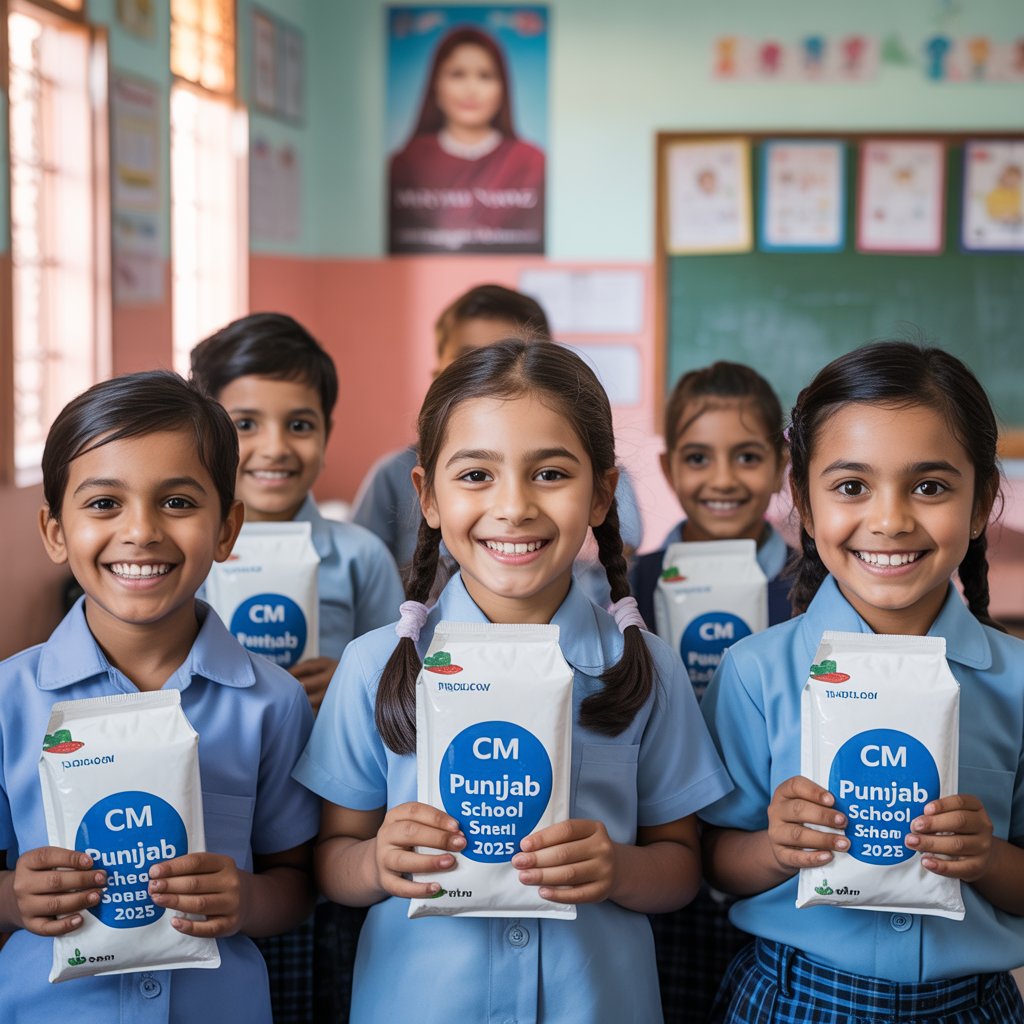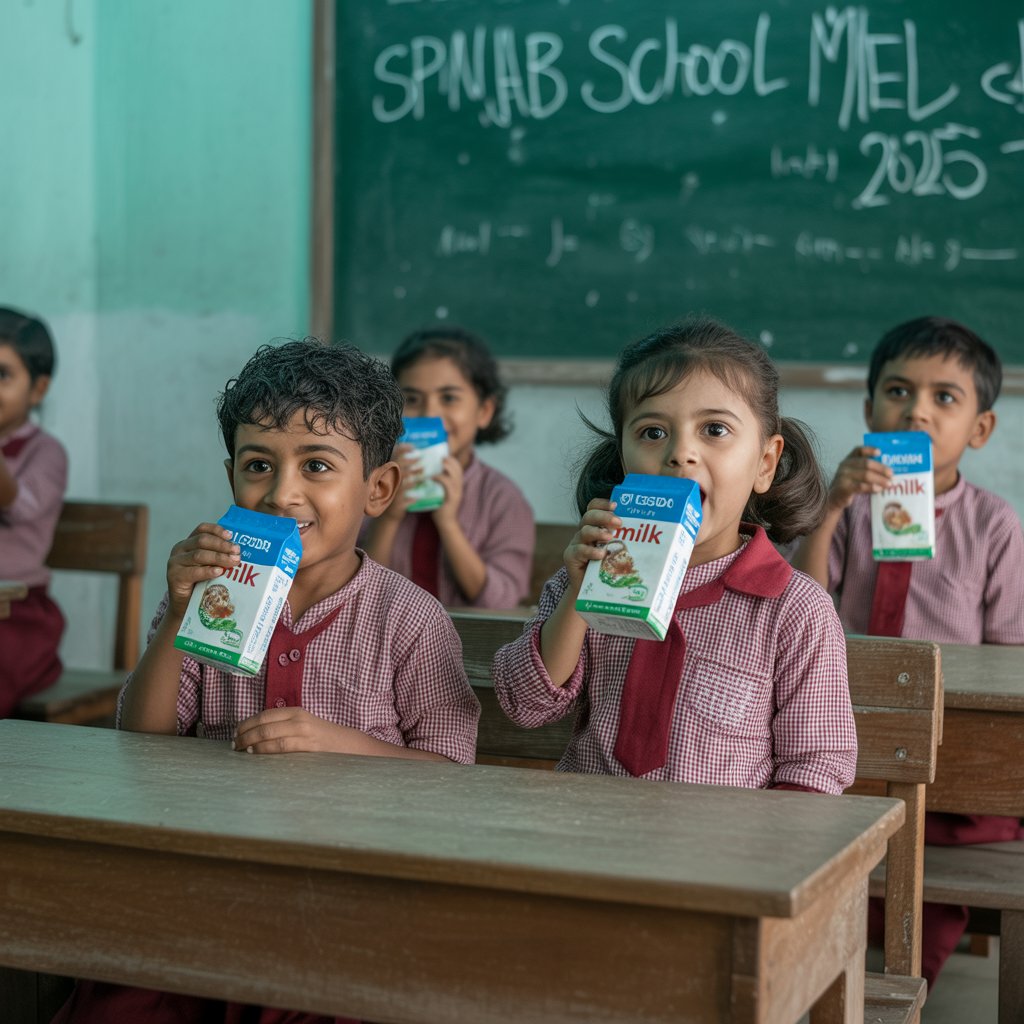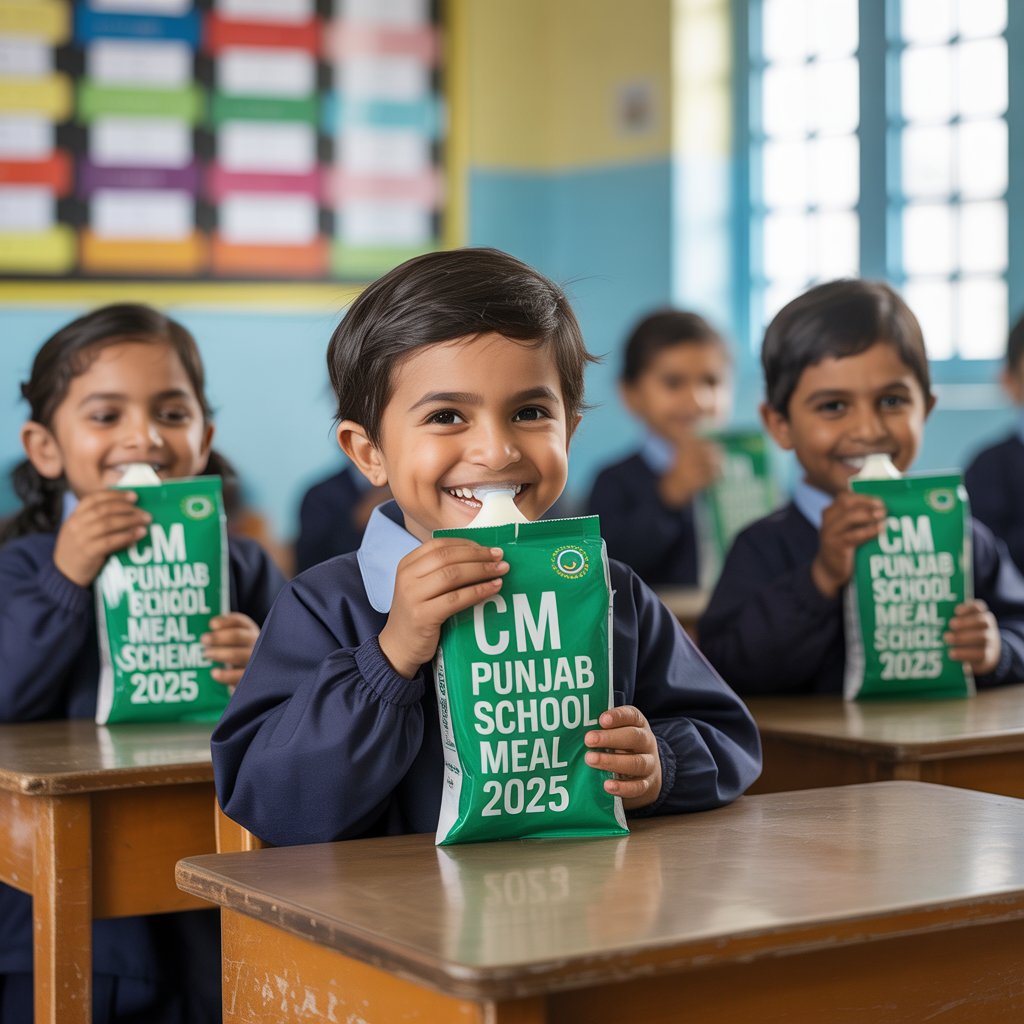CM Punjab School Meal Scheme 2025 offers free daily milk to 400k+ students, improving nutrition, attendance, and learning outcomes across Punjab.
The CM Punjab School Meal Scheme 2025 is one of the most ambitious nutrition and education-linked programs launched by the Government of Punjab, Pakistan. This initiative focuses on providing free, healthy meals to students in primary schools, with the immediate goal of improving child nutrition, school attendance, and learning outcomes. At the same time, it reflects the government’s commitment to social equity, public health, and environmental sustainability.Launched as a pilot in three districts—Dera Ghazi Khan, Rajanpur, and Muzaffargarh—the program currently benefits over 403,000 children. Students receive a 175 ml packet of milk daily for 194 academic days, spanning from August 2024 to May 2025. While designed as a pilot, the plan is to expand this scheme across Punjab in the coming years, ensuring millions of school-going children have access to reliable nutrition.

Scope and Objectives of the CM Punjab School Meal Scheme
The primary purpose of the Punjab School Meal Scheme 2025 is to provide a consistent nutritional supplement for young learners in underserved communities. It directly addresses malnutrition, a persistent challenge in Pakistan, particularly in rural and low-income households.
Key objectives of the program include:
- Improving nutrition and health: By ensuring a daily intake of essential nutrients through milk.
- Enhancing attendance and retention: Providing meals encourages parents to send their children to school regularly.
- Boosting academic performance: A nourished child is more attentive, active, and capable of better learning.
- Promoting equity: Supporting children from food-insecure households ensures no student is left behind.
- Supporting sustainability: Recycling millions of used milk packets each month, funding welfare projects within schools.
This aligns with the broader Green Punjab Policy, integrating education, health, and environmental protection into a single framework.
Project Overview and Implementation
<div style=”border:2px solid #4CAF50; padding:15px; border-radius:8px; background:#f9f9f9;”>
Sponsoring Agency: School Education Department, Punjab
Executing Agency: School Education Department, Punjab
Approval Date: 29 July 2024
Start Date: 01 July 2024
End Date: 30 June 2027
Financial Scope
- Total Project Cost: Rs. 6,092.36 million
- Initial Allocation: Rs. 500.00 million
- Revised Allocation: Rs. 4,122.39 million
- Funds Released: Rs. 4,122.39 million
- Utilization to Date: Rs. 2,931.69 million

What Is the CM Punjab School Meal Scheme?
The CM Punjab School Meal Scheme 2025 is a targeted school-feeding initiative launched in Punjab’s pilot districts—Dera Ghazi Khan, Rajanpur, and Muzaffargarh—where children in grades 1–5 receive a daily milk packet to improve nutrition and attendance. A comparative model in Malir district, Karachi (Sindh), provides hot cooked meals instead of milk, showing how such programs adapt to local contexts and resources. The CM Punjab School Meal Scheme 2025 ultimately aims to boost student health, concentration, and academic performance while encouraging community participation through recycling and reinvestment.
Coverage and Key Statistics (2025)
- Punjab Model:
- Daily provision: 175 ml milk per child
- Coverage: 403,152 children in over 3,500 schools
- Recycling impact: Over 13 million milk packets recycled monthly
- Funds generated: Proceeds from recycling reinvested in school welfare
- Sindh Model (Karachi – Malir):
- Daily provision: Hot meals served to 11,000 students
- Partners: Government of Sindh with international technical support
- Focus: Attendance, concentration, and community health outcomes
This dual approach demonstrates how provinces are testing context-appropriate models to achieve shared goals.
Why the CM Punjab School Meal Scheme 2025 Matters
School meal programs are recognized globally as one of the most effective ways to tackle hunger, malnutrition, and learning gaps simultaneously. In Pakistan, where many families face food insecurity, this initiative plays a vital role in leveling the playing field.
Measurable Benefits Include:
- Higher attendance and punctuality among primary students.
- Improved concentration and behavior in classrooms.
- Enhanced test scores and promotion rates in low-income communities.
- Reduced burden on families struggling with food expenses.
- Community welfare gains through recycling-based reinvestment.
When hunger is reduced, teachers spend less time managing restlessness and more time teaching effectively.
How the Scheme Works
Implementation of the CM Punjab School Meal Scheme involves detailed planning and strict monitoring:
- Daily Distribution: Local delivery teams supply milk packets to schools.
- Safe Handling: Schools ensure storage and hygiene standards are followed.
- Recycling: Empty packets are collected and recycled; funds go toward school welfare projects such as classroom repairs and supplies.
- Monitoring: District education officers and partner organizations oversee safety, quality, and consistency.
- Reporting: Schools maintain records of distribution, ensuring accountability.
In Sindh’s Malir program, caterers or school kitchens prepare hot meals under hygiene guidelines and portion standards.
Parents’ and Teachers’ Perspectives
For parents, the scheme provides assurance that their children receive at least one reliable meal daily. This encourages families, especially in rural areas, to send children to school rather than keeping them at home.
For teachers and schools, the program brings:
- Fewer disruptions in classrooms as hunger-related restlessness declines.
- Improved classroom climate, with better focus and peer interaction.
- More teaching time, as fed students settle quickly and concentrate longer.
- Data-driven improvements, with attendance and performance indicators helping refine delivery schedules.
Environmental and Community Impact
One of the most innovative aspects of the CM Punjab School Meal Scheme 2025 is its sustainability component. By recycling over 13 million milk packets monthly, the program not only prevents waste but also creates revenue that directly benefits participating schools.
Funds are used for:
- Minor repairs and maintenance of classrooms.
- Purchasing school supplies and learning materials.
- Supporting extracurricular or welfare initiatives.
This circular model—feed, recycle, reinvest—ensures long-term value and community participation.

Challenges and Future Prospects
Like any large-scale social program, the Punjab School Meal Scheme faces several challenges:
- Scaling up distribution to cover all 36 districts of Punjab.
- Ensuring quality control across thousands of schools daily.
- Sustainable funding as program costs increase with expansion.
- Addressing regional nutrition needs, as milk may not meet every child’s dietary requirement.
Looking ahead, policymakers are exploring the inclusion of fortified foods, diverse meal options, and greater private-sector partnerships to strengthen the scheme. Expansion to all districts by 2027 is a stated goal, aligning with both educational and public health targets.
Conclusion: CM Punjab School Meal Scheme 2025
The CM Punjab School Meal Scheme 2025 shows the Punjab government’s strong commitment to child nutrition, education, and sustainability. By providing daily milk to primary school students, the program tackles malnutrition, improves attendance, and supports better learning outcomes.
If expanded successfully, it can serve as a model school-feeding initiative in South Asia, combining education, health, and community empowerment in one impactful policy.

